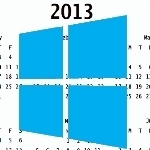
by Pat McMullen in Daves Computer Tips
2013: The year of Microsoft
2010 will be remembered by some as the year of the Great Patent Wars. After it became clear that Android had really taken off and was making serious money for companies like Google, Motorola, Samsung, and HTC, Apple chose to fight back. Litigiously. From March 2010 to March 2011, Apple filed 37 lawsuits against Android software and hardware manufacturers. The Cupertino giant sued over everything from device size and shape to how devices accept and process touch input, even down to the very names used for new tech-jargon features like apps and stores and marketplaces. Apple wanted to make their message clear: any ideas we stole first are ours now, so you’d better try something else. Much of the legal drama has cooled off now as courts and ITCs in different regions of the globe have ruled that Samsung, Motorola, and HTC have made the necessary changes to adequately differentiate themselves from Apple, iOS, and the iPhone (though it seem Apple would be unhappy with anything short of the exclusive rights to build touchscreen-only devices and sell apps). During this time of Great Patent Wars, Microsoft was developing their latest smartphone OS: one that bears no resemblance to any UI or OS anyone has seen before on anything. When the first Windows Phone 7 handsets were made available in October of 2010, the world was introduced to Metro UI. Especially at the time, Microsoft and Window Phone were joining an already saturated market, not to mention their radically different design and theory. The phones haven’t sold super well here in the US, but they’re doing better every quarter (especially since the release of the Nokia Lumia). Coming up on its two year anniversary, Metro is still making the steady approach to its tipping point. With its soon-to-be ubiquitous presence on all of Microsoft’s latest devices (PCs, the Xbox 360, and Windows Phone), the Metro UI will be making its way into your life one way or another in 2013. This is only the beginning.
Sure a lot of people are voicing concern over the major switch to Metro UI they can expect with Windows 8, but a radical new paradigm can take a little while to take hold. (Bad example: Nobody wanted or played Nintendo’s Virtual Boy until they were discontinued.) In the beta releases and consumer previews, developers, writers, and the general public have gotten a chance to begin to familiarize themselves with navigating within Metro UI. We’ve heard them loud and clear: it’s different, too different for many. But that’s okay. It should be. It’s 2012 and our computers and technology are vastly different than even two years ago. The things we do with our devices have changed. We use the internet more and more. We store our data in the cloud. We stream media over the internet through gaming consoles, set-top boxes, and home theatre pcs. We stopped carrying iPods and mp3 players because our phones are capable of the task. Instead of gaming on computer or with the consoles that now act as Netflix and Hulu portals, we play short and simple app games. Things we once did on our laptops are now easier and more fun on tablet or phone. For all of this to happen the industry has had to focus much of its development effort into mobilizing their offerings. Microsoft has had this vision of the future and has been preparing in full force. They’ve been subliminally conditioning us all for their next generation in peripheral computing or ecosystem integration or whatever term you prefer to use to describe using one interface on many different devices. In 2009 and 2010, Microsoft wasn’t preparing their mobile platform and their next Windows iteration for 2011 and 2012. Microsoft is busy preparing their devices and software for 2013, 2015, and beyond. Consumer sales speak loudly, and in the recent years they’ve said that people like the simplicity and continuity of a close ecosystem of devices, such as the one Apple provides with Mac OS, iOS, and iCloud. Microsoft recognized this, and has responded with an ecosystem and user interface built for the future.
Apart from making wonderful products that seem to “just get” their users, much of Apple’s success in recent years can be somewhat attributed to wide-scale positive press. Most of the highest traffic technology and news sites feature many more Apple stories than Windows and/or Android stories on a given day. This is especially true around events such as Apple’s World Wide Developer Conference in June, and the iPhone release every Fall. Sure you could argue that the news sources are covering stories that t heir readers care about, but it is often a self-fulfilling prophecy. If consumers read more about Apple (especially if those stories are favorable, as they usually are based on Apple’s incredible product lines) they are going to think more about Apple, and thus be more likely to buy Apple when the time comes. Social psychologists might call this an availability heuristic bias, and consumer psychologists refer to this as a being on one’s automatic list. I believe that this is all going to change during the last quarter of 2012. Microsoft is innovating and pushing Metro in three main tech arenas: mobile phones, game consoles and home theatre, and personal computing. They’re going to be getting a ton of coverage in all three. When Smartglass (more on this later) and internet explorer arrive on the Xbox, you’re going to hear a lot about it. When Windows 8 drops this fall, you’ll be hearing even more about it. As people begin to love Metro on their Xboxes and computers, they are going to buy more and more Windows phones. When that happens, you’re going to hear a lot about it. Within the next 6 months, Microsoft will be garnering more press coverage than they have at any point during the last several years, maybe even decade. Sure, some of the articles will be negative reviews and rants, but as Lindsay Lohan’s publicist likes to believe, “all press is good press”.
The Metro UI and Ecosystem will reach everyone–Article Continued Here
This excerpt is shared with permission from davescomputertips.com.




